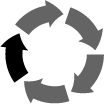Using Evidence to Improve Learning

At this final step in the process, you want to be asking: what have I learned from the process to improve both the program and student learning?* At this stage, you’re essentially “closing the loop,” determining what your analysis indicates and capitalizing on the investment that your program has made in its assessment activities. A critical factor in this step is the often overlooked issue of sustainability. When determining how well your department/program’s assessment process can be continued in the future, consider the following questions:
- Have the program faculty developed a process that is useful and beneficial to all involved—faculty members as well as students?
- Can and will the process be replicated as time and circumstance require?
- Has the process produced the kind of data necessary for critical decisions to be made?
- How will assessment lead to program improvement?
During this stage, you’ll probably find that you’ve collected more data than you can realistically work with. If that’s the case, focus on the learning goal(s) most important to your department/program and extract the relevant data. Narrowing your focus during the beginning of the assessment process is also helpful in securing the most useful data. Keep in mind that the process is an iterative one. Data that seem irrelevant to your current focus might be useful in the future. Your findings will continue to build off one another; the key is to develop a sustainable, ongoing process that leads to informed decision-making about curriculum, budget, and staffing concerns.
